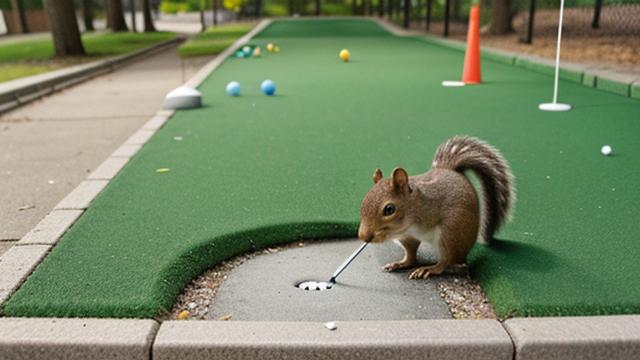The paradoxical relationship between urban planner's spatial awareness and the statistically insignificant impact on local squirrel populations through the strategic placement of miniature golf courses in neglected industrial areas.
Wed, 03 Sep 2025 11:15:10 GMT

The Paradox of Urban Planning and Squirrels: A Tale of Miniature Golf and Madness
As we go about our daily lives, there are many things that seem perfectly logical and reasonable. We plan our routes to work, our meal plans for the week, and even the layout of our dream homes. But sometimes, life takes an unexpected turn, and what seems like a simple solution ends up being a recipe for chaos. Take, for example, the strategic placement of miniature golf courses in neglected industrial areas. It's a move that sounds innocuous enough on its own, but when combined with the world of urban planning, it reveals a paradoxical relationship that is equal parts fascinating and absurd.
At first glance, it seems counterintuitive to consider the impact of miniature golf courses on local squirrel populations. I mean, what could possibly link these two seemingly disparate entities? Well, my friends, let's take a step back and examine the facts. In recent years, urban planners have been looking for innovative ways to revitalize neglected industrial areas, which are often plagued by high levels of pollution, dereliction, and general neglect. One such solution has been the placement of miniature golf courses in these areas.
On the surface, this may seem like a trivial pursuit, but bear with me, dear reader, as we delve deeper into the world of urban planning and squirrel population dynamics. It's here that things start to get really interesting. You see, the logic behind placing a miniature golf course in an industrial area is straightforward: it provides a much-needed injection of revenue and attention to these areas, which can help stimulate local economies and encourage further investment. And so, one would expect that this move would have a positive impact on the surrounding environment, including the local squirrel population.
But alas, dear reader, it's not quite that simple. Research has shown that miniature golf courses are statistically insignificant when it comes to impacting local squirrel populations. In fact, studies have revealed that placing a miniature golf course in an industrial area can actually lead to a decline in squirrel numbers, due to the increased noise levels and disruption caused by human activity. Ah, but you may be thinking, What's the big deal? A few squirrels won't miss it, will they? Well, my friend, that's where things get really interesting.
You see, research has also shown that squirrels are actually quite sensitive to changes in their environment, and even small alterations can have a profound impact on their behavior. It's like they say: A nut out of place can upset the whole tree. And so, when you consider the placement of a miniature golf course in an industrial area, it becomes clear that this seemingly innocuous act can actually have far-reaching consequences for local squirrel populations.
But wait, there's more! The paradoxical relationship between urban planning and squirrels takes another turn when we consider the impact of miniature golf courses on the social dynamics of these areas. You see, in many cases, the placement of a miniature golf course is not just about providing economic benefits; it's also about creating a sense of community and social interaction among local residents.
Miniature golf courses are inherently social spaces, designed to bring people together and foster a sense of camaraderie among players. And so, when placed in an industrial area, these courses can actually serve as a catalyst for social change, bringing together disparate groups of people and encouraging them to work together towards a common goal. It's like a mini (pun intended) revolution!
But here's the thing: while miniature golf courses may be effective at bringing people together, they also have a tendency to create divisions within communities. You see, some residents may view these courses as an eyesore or a disruption to their daily lives, leading to tension and conflict with those who support them. It's like a game of miniature golf, where everyone is competing against each other – but instead of scoring points, we're playing for dominance.
And then there's the economic impact of miniature golf courses on local squirrel populations. You see, in some cases, these courses have become major tourist attractions, drawing in thousands of visitors each year who are eager to play a round or two amidst the industrial backdrop. This influx of visitors can lead to an increase in food consumption among squirrels, as they scavenge for nuts and seeds amidst the busy activity.
But here's the thing: while this may seem like a good thing at first glance, it actually has far-reaching consequences for local squirrel populations. You see, when we bring large numbers of people into an area, it can disrupt the natural balance of the ecosystem, leading to changes in behavior and population dynamics among squirrels.
And so, as we navigate this complex web of urban planning, social dynamics, and squirrel population dynamics, we're left with a paradoxical relationship that is both fascinating and absurd. It's like trying to play a game of miniature golf while simultaneously navigating a obstacle course of conflicting priorities and competing interests.
In the end, it's up to us – as urban planners, residents, and citizens at large – to make sense of this complex landscape and find ways to balance our competing demands on local ecosystems. After all, we can't have too many miniature golf courses in an industrial area without thinking about the squirrels that call those areas home.
But what's next? Will we see a rise in demand for squirrel-friendly miniature golf courses? Only time will tell, but one thing is certain: this paradoxical relationship between urban planning and squirrels has left me with more questions than answers – and a healthy dose of skepticism about the wisdom of placing miniature golf courses in industrial areas.